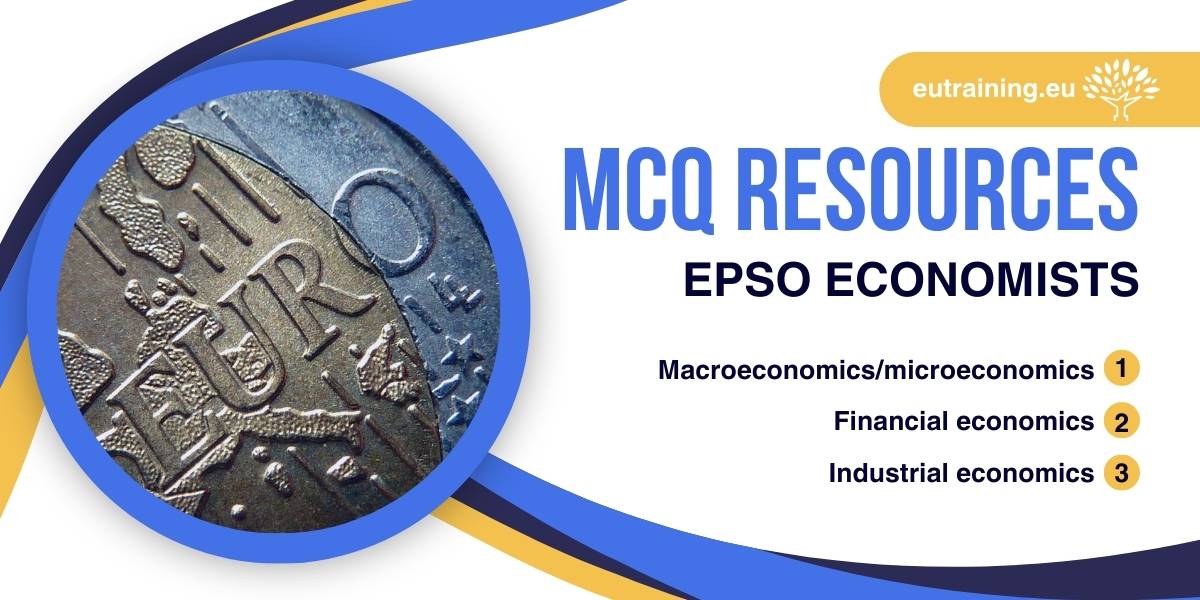
EUT | MCQ Resources
UPDATE - Please read this pdf document for updated information about the Economist MCQ practice questions in our database.
EPSO/AD/402/23 | Economists
EU Training’s practice questions aim to facilitate your preparation for the EPSO field-related MCQ questions of the Economists competition exam. The questions cover a broad range of generic topics for all three profiles while closely following EPSO's Notice of Competition.
EPSO/AD/402/23-1
Macroeconomics topics include monetary economics, international economics, macroeconomic models of adjustment (IS-LM and AS-AD models), labour economics, real business cycles and theories of exogenous and endogenous growth.
Microeconomics topics covered include the theory of consumer choice, demand and supply models, elasticities of demand and supply, theory of producer choice, the study of market structures, rudimentary contract and game theory, as well as some basic notions of competition economics.
EPSO/AD/402/23-2
Financial Economics includes questions on investments and banking, risk management, portfolio management, corporate finance, accounting, business plan analysis and the theory of financial regulation. The questions also include numerous exercises on public procurement theory.
EPSO/AD/402/23-3
Industrial Economics topics covered include questions on competition economics, market structures, theories of competitive harm, competition regulation, game theory and contract theory. There are also numerous questions devoted to enhancing EPSO candidates’ knowledge about how the Commission functions as a supranational competition authority.
------------------------------------------------------------------------------------
Reading lists | Online resources
Macro-/microeconomics:
- Eurostat Glossary
- European Central Bank (ECB) Explainers
- European Commission - Economic and Monetary Union
- European Commission - Banking and Finance
- European Investment Bank (EIB) - Who We Are
- European Stability Mechanism (ESM) - Who We Are
- European Systemic Risk Board (ESRB) - Overview
- European Parliament - Economic and Monetary Affairs Committee (ECON)
- European Semester - Economic and Social Policy of the EU
- ECON102: Principles of Macroeconomics | Saylor Academy (for purchase)
- Introduction to Microeconomics
- Introduction to Macroeconomics Lecture Notes
- Resources | Principles of Microeconomics | Economics | MIT OpenCourseWare
BOOKS
- Mankiw, N. G. (2017). Principles of Economics (8th ed.). Cengage Learning.
- Krugman, P., & Wells, R. (2018). Macroeconomics (5th ed.). Worth Publishers.
- Varian, H. R. (2014). Intermediate Microeconomics: A Modern Approach (9th ed.). W. W. Norton & Company.
- Tadelis, S. (2012). Game Theory: An Introduction. Princeton University Press.
Financial economics:
- European Systemic Risk Board (ESRB) - Key Features
- Banking Recovery and Resolution Directive (BRRD) - Overview
- European Payments Council - SEPA Glossary
- EU Regulation on Benchmarks
- Insurance Distribution Directive (IDD) - Overview
- European Banking Authority - Risk Assessment Reports
- MiFID II and MiFIR - Overview
- EU Regulation on Money Market Funds (MMFs)
- European Central Bank - Financial Stability Review
- Principles of Financial Economics
- Lectures on Financial Economics
- The Economics of Money, Banking and Financial Markets
- Quantitative Financial Economics: Stocks, Bonds and Foreign Exchange
BOOKS
- Bodie, Z., Kane, A., & Marcus, A. J. (2017). Investments (11th ed.). McGraw-Hill Education.
- Ross, S. A., Westerfield, R. W., & Jaffe, J. (2019). Corporate Finance (12th ed.). McGraw-Hill/Irwin.
- Brigham, E. F., & Ehrhardt, M. C. (2016). Financial Management: Theory & Practice (15th ed.). Cengage Learning.
- Hull, J. C. (2018). Risk Management and Financial Institutions (5th ed.). Wiley.
- Horngren, C. T., Sundem, G. L., Schatzberg, J. O., & Burgstahler, D. (2019). Introduction to Management Accounting (17th ed.). Pearson.
Industrial economics:
- EU Competition Policy and the Consumer
- DG Competition – Horizontal Block Exemptions
- European Competition Network (ECN) - Brief
- State Aid Modernisation (SAM)
- EU Merger Regulation
- EU Antitrust Procedures
- Antitrust Damages Directive
- Block Exemption Regulations on Vertical Agreements
- EU State Aid Scoreboard
- EC326 Industrial Economics 2- Lectures
- Industrial Organization I | Economics | MIT OpenCourseWare
- Ph.D. Industrial Organization | Allan Collard-Wexle
BOOKS
- Cabral, L. M. B. (2017). Introduction to Industrial Organization (2nd ed.). MIT Press.
- Tirole, J. (1988). The Theory of Industrial Organization. MIT Press.
- Church, J., & Ware, R. (2000). Industrial Organization: A Strategic Approach. McGraw-Hill.
- Pepall, L., Richards, D., & Norman, G. (2018). Industrial Organization: Contemporary Theory and Empirical Applications (5th ed.). Wiley.
- Motta, M. (2004). Competition Policy: Theory and Practice. Cambridge University Press.
---------------------------------------------------------------------------------